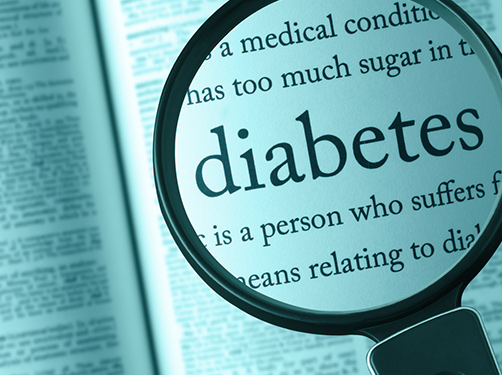Hospital stays and rehabilitation for diabetes
Scientific support: PD Dr. Martin Füchtenbusch
Diabetological co-supervision is desirable for individuals with diabetes during planned inpatient hospital stays. This is because not every hospital has a diabetes team that regularly measures blood sugar levels and takes into account the necessary treatment. However, this is important to keep metabolic control stable - for example during an operation.
Rehabilitation can be useful in patients whose diabetes causes recurring problems and restricts their quality of life. You can find out what offers are available here.

Contents
- Is the facility suitable for people with diabetes?
- How can you prepare for a hospital stay?
- Causes of hospitalization for diabetic patients
- Packing list: What to take to the hospital or rehab clinic when you have diabetes
- What should people with diabetes know before an operation?
- How is diabetes treated before, during and after an operation?
- What happens during a diabetic emergency during an inpatient hospital stay?
- Rehabilitation
1. Is the facility suitable for people with diabetes?
Controlling sugar metabolism is not always easy during a hospital or rehab stay, as stressful situations can cause blood sugar levels to rise. This is because, among other things, the stress hormones adrenaline and cortisone continuously trigger the release of sugar by the liver to provide energy.
No food can be eaten for several hours before any operation, which often further impedes metabolic control. For this reason, the correct dosage of blood sugar-reducing medication, especially insulin, must be carefully monitored.
Therefore, diabetologic co-supervision during the stay is desirable. This cannot be guaranteed in every hospital or rehab facility.
Therefore, make sure - if possible in advance - that your facility is suitable for treating people with diabetes: The German Diabetes Association (DDG) has been certifying hospitals since 2013 with the title “Hospital Suitable for Diabetic Patients”. These hospitals can be found on the website of the specialist association (Link in German).
2. How can you prepare for a hospital stay?
Talk to your treating specialist about upcoming hospital or rehab stays. The long-term blood glucose value (HbA1c) should be adjusted as optimally as possible before any operations. In elderly patients, HbA1c values up to 9 percent (75 mmol/mol) are also acceptable. Ideally, however, the long-term blood glucose value should correspond to the normal controlled levels or your individual therapeutic goal.
High long-term blood glucose levels affect how well possible anesthesia is tolerated. If an operation is pending, the risks for complications increase in poorly controlled diabetes. High blood glucose levels can also negatively affect wound healing. If the HbA1c value is too high, ask your diabetes team how you can improve your treatment.
Clarify the following issues:
- Find out if treatment with insulin or blood sugar-lowering medication needs to be adjusted for the time in the hospital.
- Ask if medications for diabetes have to be discontinued before an intervention or certain types of examinations.
- Find out if the insulin pump has to be removed before the operation.
- Ask if you can still eat dextrose to counteract an impending episode of low blood sugar levels.
- Inform the hospital staff of all previous diabetes-related treatments: What types of medication are you taking? How often do you test your blood sugar levels? Do you have diabetes-related complications or other diseases?
- Clarify with the attending healthcare professional any other medications you are taking. This also includes dietary supplements and herbal preparations from pharmacies, drugstores or the Internet.
3. Causes of hospitalization for diabetic patients
Diabetes can often be managed well on an outpatient basis. However, there are several situations in which hospital care may be necessary for diabetics:
- Severe acute hypoglycemia or hyperglycemia
- Unexplained blood glucose fluctuations, especially frequent nocturnalhypoglycemia
- Suspected diabetes-related complications or secondary and concomitant diabetes diseases that require inpatient treatment
- Significantly high HbA1c values after 6 to 9 months despite intensive therapy
- Psychological reasons
- Change of therapy to a insulin pump system
- Diabetes diagnosis
If you have been newly diagnosed with type 1 diabetes, it is now usually treated on an outpatient basis. In individual cases and particularly severe courses with severe metabolic derailment and ketoacidosis, inpatient hospitalization may also be necessary.
During your hospital stay after your diabetes diagnosis, you will learn:
- how to recognize dangerous metabolic derailments,
- when you need to inject how much and which insulin,
- how your diet affects diabetes and how you should adjust it; and
- what to do in an emergency.
Individual therapy goals, for example a target value for the long-term blood glucose value (HbA1c), are also defined. Once diabetes has been well controlled and metabolism has recovered, therapy can be continued on an outpatient basis with increasing independence. How long you need to stay in the hospital after a type 1 diabetes diagnosis depends on how well your diabetes can be controlled and how quickly you can cope with the therapy.
In type 2 diabetes, it may also be necessary to initially adjust blood glucose in the hospital. This is the case when complications occur or the diabetes is very pronounced. If your type 2 diabetes has already been treated as an outpatient for 12 months and your HbA1c level has not yet been reduced sufficiently, hospitalization may also be necessary.
4. Packing list: What to take to the hospital or rehab clinic when you have diabetes
- Your medication(s) (tablets, GLP-1 receptor agonists, insulin) for the planned duration of stay and a little more as a reserve
- Medication schedule (list of all medications you are currently taking, including over-the-counter medications, dietary supplements, and herbal supplements) and information on (emergency) basal rate, injection factors, and correction regimen (if available)
- Summer: Cooler bag for insulin - not all clinics have air conditioners or refrigerators in the rooms and insulin becomes inactive at temperatures above 30 degrees
- Standard equipment with blood glucose meter and/or sensors for continuous glucose monitoring (CGM system), test strips, cannulas and other diabetes aids
- Emergency carbohydrates (for example, dextrose or fruit juice)
- Previous findings of your treating medical specialists, hospital referral and insurance card
- Diabetes passport
- Blood sugar diary
- Name, address, and telephone number of your treating physician
- Personal items, such as underwear, slippers, pajamas, hygiene products, etc.
Tip:
Just in case you have an unexpected hospital stay, it makes sense to have a pre-packed bag.
Good to know:
Blood sugar is not only influenced by diet and exercise. Stress, operations, exercise, infections and medications can also alter blood glucose levels. Stress in particular causes it to rise, as do cortisone preparations. Because hospitalization often involves stress, be prepared for your blood sugar to be a little higher than you are normally used to.
5. What should people with diabetes know before an operation?
Ideally, the doctor will schedule the intervention for the morning. This means diabetics do not have to fast for an extended period and stop taking their medication.
Blood glucose levels should be monitored regularly. Blood glucose levels before, during, and after an operation should ideally be between 110 to 180 mg/dl (6 to 10.0 mmol/l).
If needed, during a longer procedure, patients will receive an insulin and dextrose infusion. This allows for control of the blood sugar levels.
The following information should be considered when using blood sugar-reducing medications. Ultimately the medical specialist will decide exactly how to proceed:
- People with type 2 diabetes who take metformin usually need to stop taking the medication 48 hours before an operation or before examinations using contrast agents (e.g., imaging procedures such as X-ray or MRI).
- Other types of blood sugar-reducing tablets, such as sulfonylureas, glinides, SGLT-2 inhibitors or glitazones must be taken in the evening before the operation with the last meal.
- It may potentially be necessary to switch to insulin. This depends on the individual case.
- For people with insulin-dependent diabetes, the treatment is adjusted depending on the type of insulin therapy as well as the duration and severity of the procedure. You can continue with your normal treatment until the day of the operation. The usual treatment is carried out up to the day before the operation.
- Bariatric operations, such as stomach reduction, alter the metabolism of sugar. Diabetes treatment is usually readjusted after an operation.
- Often, people with diabetes are given other medications such as hypertensives. Again, some medications must be discontinued before the scheduled operation. Discuss this with your doctor when the operation date is set.
6. How is diabetes treated before, during and after an operation?
The blood sugar level is controlled based on the length of the fasting phase. This is the period between the last meal and the first meal after the operation.
1. Examinations and operations with a short fasting phase (4-6 hours):
- At the first meal after the operation, you re-start the treatment with blood sugar-reducing medication.
- If you are treated with a mixed insulin, i.e., a combination of fast-acting insulin and delayed-action insulin (conventional insulin therapy), a significant reduction in the insulin dose is necessary before the examination or operation. Discuss with the attending physician how you should proceed.
- When using intensified insulin therapy, injectt he basal insulin as normal. For insulin pump therapy, the basal rate can also remain unchanged. Monitor your blood sugar levels frequently. If necessary, correct your insulin levels using rapid-acting insulin. The amount of insulin required may increase after the procedure.
2. Operations with a medium to long fasting phase (6 to 24 hours and more than 24 hours):
- During the operation, the blood sugar is controlled using a glucose-insulin infusion (more precisely, a glucose-insulin-potassium infusion (GIK). Blood glucose levels are measured every hour. After an operation, blood glucose is checked every 1 or 2 to 4 hours until glucose metabolism returns to normal.
- For long fasting phases (more than 24 hours), in the early stage, treatment is the same as the medium fasting phase. However, later the patient is given enteral nutrition.
- The operation can release more hormones that are antagonists of insulin. Therefore, you may need more insulin and fluids temporarily after a long operation.
7. What happens during a diabetic emergency during an inpatient hospital stay?
At the hospital, your diabetes diagnosis will be clearly noted in your medical record for all to see. This is important so that healthcare professionals can take immediate and appropriate action in the event of a diabetic emergency.
The risk of metabolic derailment during hospitalization is increased. Reasons for this are stress, infections or operations. These can lead to serious to life-threatening diabetic emergencies such as severe hypoglycemia or severe hyperglycemia.
If blood glucose levels drop during an inpatient hospital stay, direct countermeasures can be taken. Mild hypoglycemia can usually be compensated for by drinking fruit juice, for example. In cases of severe hypoglycemia, either a glucose infusion must be administered or, if venous access is not possible, glucagon must be sprayed into the nose or injected into the muscle or under the skin.
If, on the other hand, blood glucose is too high, which may lead to diabetic ketoacidosis, intensive medical treatment is required. For this purpose, blood sugar is slowly lowered with the help of insulin infusions, the circulation is stabilized with fluids and electrolytes, and the acid-base balance of the blood is normalized. Most complications occur primarily in people with type 1 diabetes.
Good to know:
Here you will find a brochure from the diabetesDE - Deutsche Diabetes Hilfe and DDH-M (Link in German) with more information and tips to help people with diabetes prepare for a planned hospital stay and reduce potential risks.
8. Rehabilitation
In the case of acute or chronic disease, it may get to the point that a person no longer feels able to cope with the everyday routine in the workplace. To help restore health and enable affected individuals to return to work, for example, the German Pension Insurance and statutory health insurance funds offer outpatient or inpatient rehabilitation measures. In order to take part in rehabilitation, a corresponding application must be submitted together with your attending physician.
Rehabilitation exercises
Regular physical activity not only has a beneficial effect on blood glucose levels and other metabolic parameters, but also increases well-being and contributes to a better quality of life. People with diabetes can particularly benefit from this.
Sometimes, however, there are uncertainties as to which exercises and how much physical exertion are actually beneficial. Here, your doctor will give you advice and can also issue a prescription for participation in “rehab exercises”. The medical prescription must then be approved by the payer, i.e. the respective health insurance company.
Rehabilitation exercises that can be prescribed include:
- Gymnastics (including water gymnastics)
- Endurance and strength endurance exercises
- Swimming
- Movement games (exercises in groups)
Rehabilitation exercise groups for people with diabetes usually focus on endurance, coordination, strength, and flexibility. Blood pressure, pulse and blood sugar measurements before, during and after physical activity are also part of the program. The diabetes exercise groups are led by exercise instructors with specialist qualifications in internal medicine. In order to be prescribed by a doctor, rehabilitation sports programs must be recognized by the German Disabled Sports Association (DBS).
Tip:
You can search for rehabilitation sports groups near you on the website of the German Disabled Sports Association (Link in German).
Good to know:
Sport activities increase the risk of hypoglycemia. This is something to keep in mind when participating in exercise classes. Caution is especially advised if you have not exercised much in the past. For more information, see the articles Exercise and type 1 diabetes and Exercise and type 2 diabetes.
Inpatient rehabilitation
Rehabilitation in a hospital may be necessary if health problems are imminent or already present which mean that normal work, participation in social life or similar are no longer possible. This also includes remaining physically and mentally independent. Such a situation exists, for example, if your blood sugar is difficult to adjust.
Rehabilitation may also be necessary if you had to go to an acute care hospital because of your condition. Such additional treatment will then be recommended to you by the hospital. The application is made directly by the acute care hospital and they will organize a place for you in a rehabilitation clinic. Within 14 days after you are discharged from the hospital, you will then begin your rehabilitation.
Tip: Would you like to know what rehabilitation options are available, what the requirements are and how to apply for rehabilitation? Comprehensive information on the rehabilitation services of the German Pension Insurance can be found here (Link in German).
Rehabilitation is also available for children and adolescents with diabetes. Appropriate measures can be taken to overcome health problems, increasing the possibilities of regularly attending school, training or studying.
Sources:
ÄrzteZeitung: Worauf Diabetiker beim Reha-Antrag achten müssen. (Letzter Abruf: 16.06.2023)
Bundesarbeitsgemeinschaft für Rehabilitation: Rahmenvereinbarung über den Rehabilitationssport und das Funktionstraining. (Letzter Abruf: 16.06.2023)
Bundesgesundheitsministerium: Rehabilitation. (Letzter Abruf: 16.06.2023)
Bischoff, M. et al.: Perioperativer Umgang mit Begleitmedikation. Anästhesiologie und Intensivmedizin. In: Anasthesiologie und Intensivmed, 2019, 60: 560-571
Bundesärztekammer et al.: Patientenleitlinie zur Nationalen Versorgungsleitlinie Therapie des Typ-2-Diabetes. 1. Auflage. Version 1. 2015
Bundesärztekammer et al.: Nationale Versorgungsleitlinie Therapie des Typ-2-Diabetes. Langfassung. 1. Auflage. Version 4. 2014 (Gültigkeit abgelaufen, in Überarbeitung)
Bundesverbandes Klinischer Diabetes-Einrichtungen: Stationäre Krankenhausbehandlung bei Diabetes mellitus. In: Diabetes-Forum, 2015, 27: 42-43
Deutsche Diabetes Gesellschaft: S3-Leitlinie Therapie des Typ-1-Diabetes. 2. Auflage. 2018
Deutsche Diabetes Gesellschaft: Positionspapier der Deutschen Diabetes Gesellschaft zur Therapie des Diabetes mellitus im Krankenhaus. 2016
Deutsche Diabetes-Hilfe et al.: Mit Diabetes mit Krankenhaus: Was Sie bei einem Krankenhausaufenthalt beachten sollten. 2014
Deutsche Rentenversicherung: Warum Reha? (Letzter Abruf: 16.06.2023)
Deutsche Rentenversicherung: Reha für Kinder und Jugendliche. (Letzter Abruf: 16.06.2023)
Diabetes-Zentrum Quakenbrück: Einweisungsgründe. (Letzter Abruf: 16.06.2023)
Schreiner, M. J. et al.: Welche Medikamente sollen vor Anästhesien abgesetzt werden? In: Arzneiverordnung in der Praxis, 2019, 46: 39-44
As of: 16.06.2023





